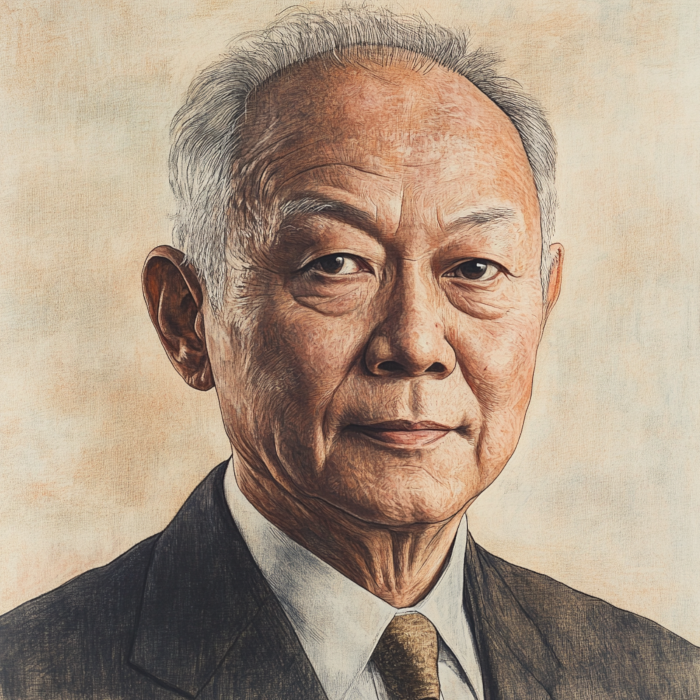


Lee Kuan Yew (1923–2015) was a pivotal figure in the history of Singapore and one of the most influential statesmen of the 20th century. As the founding Prime Minister of Singapore, Lee is widely credited with transforming the island nation from a small, underdeveloped British colony into one of the world's most prosperous and well-governed countries. His leadership, often characterized as pragmatic and authoritative, left an indelible mark on Singapore's development and its global standing.
Birth: September 16, 1923, in Singapore, which was then part of the Straits Settlements under British colonial rule.
Family Background: Lee was born into a well-educated Chinese family. His grandfather, Lee Hoon Leong, was a prominent businessman, and his father, Lee Chin Koon, worked as a storekeeper. Lee Kuan Yew grew up speaking English, which was the language of the elite under British rule, and he was deeply influenced by British culture and education.
Education: Lee Kuan Yew excelled academically and attended the prestigious Raffles Institution in Singapore. During World War II, when the Japanese occupied Singapore, Lee witnessed the horrors of war and occupation, which profoundly influenced his views on security and governance.
After the war, Lee went to the United Kingdom to study law at the University of Cambridge, where he graduated with a first-class honors degree. While in England, he became politically active, advocating for an end to colonialism and the independence of British colonies in Asia.
Return to Singapore: Lee returned to Singapore in 1949 and quickly became involved in politics. He initially worked as a lawyer but soon turned his full attention to political activism.
People's Action Party (PAP): In 1954, Lee co-founded the People's Action Party (PAP), a political party that advocated for self-governance and later independence from British rule. The PAP's platform combined anti-colonialism with a commitment to social welfare, economic development, and non-communism, which attracted a broad base of support.
Struggle for Independence: In 1959, Singapore achieved self-governance, and Lee Kuan Yew became the country's first Prime Minister. He led Singapore through a period of significant political turmoil, including its brief merger with Malaysia in 1963 and subsequent separation in 1965, which led to Singapore's full independence.
As Prime Minister from 1959 to 1990, Lee Kuan Yew implemented a series of transformative policies that laid the foundation for Singapore's rapid economic development and social stability. His leadership was marked by several key strategies:
Economic Development: Lee focused on transforming Singapore into a global financial and trade hub. He attracted foreign investment by creating a stable, corruption-free government and offering incentives to multinational corporations. Lee's policies emphasized education, industrialization, and infrastructure development, which helped Singapore transition from a labor-intensive economy to a high-tech, service-oriented one.
Housing and Social Policies: Lee's government implemented an ambitious public housing program that provided affordable, quality housing to the majority of Singaporeans. This program played a crucial role in fostering social cohesion and improving the standard of living.
Strict Governance and Rule of Law: Lee's administration was known for its strict adherence to the rule of law and a no-nonsense approach to governance. He maintained social order through rigorous law enforcement and a limited tolerance for dissent. Critics often described his leadership as authoritarian, but Lee argued that such measures were necessary to maintain stability and promote economic growth in a small, vulnerable country.
Multiracialism and National Identity: Singapore is a multicultural society, and Lee was committed to maintaining racial harmony and preventing ethnic divisions. He promoted the idea of a unified Singaporean identity while respecting the cultural diversity of its population. Policies were introduced to ensure that all ethnic groups had equal opportunities and that no single group dominated.
Transition of Power: Lee Kuan Yew stepped down as Prime Minister in 1990 but remained a significant influence in Singaporean politics. He served as Senior Minister in the government of his successor, Goh Chok Tong, and later as Minister Mentor when his son, Lee Hsien Loong, became Prime Minister in 2004.
Global Influence: Lee was highly respected by leaders around the world and often consulted on issues of governance and development. His insights on leadership, governance, and economic management were sought after, and he was regarded as a visionary who successfully navigated the challenges of building a nation from scratch.
Writings and Legacy: Lee Kuan Yew authored several books, including his memoirs, The Singapore Story, and From Third World to First: The Singapore Story, where he detailed his views on governance, economics, and international relations. His leadership philosophy emphasized pragmatism, meritocracy, and the need for a small country to maintain strong defense capabilities.
Death: Lee Kuan Yew passed away on March 23, 2015, at the age of 91. His death was met with an outpouring of grief in Singapore, where he is widely regarded as the "Father of the Nation." His state funeral was attended by numerous world leaders, reflecting his global stature.
Legacy: Lee Kuan Yew's legacy is deeply embedded in Singapore's success story. Under his leadership, Singapore transformed from a small, impoverished island with few natural resources into one of the world's most prosperous and well-governed nations. While his leadership style has been critiqued for its authoritarian elements, many Singaporeans credit him with ensuring the country's survival and prosperity in a challenging regional and global context.
Today, Lee Kuan Yew is remembered as a pragmatic and visionary leader whose policies and governance model have been studied and admired by policymakers around the world. His influence continues to shape Singapore, and his contributions to the nation remain a central part of its identity and history.

We use cookies
We use cookies and other tracking technologies to improve your browsing experience on our website, to show you personalized content and targeted ads, to analyze our website traffic, and to understand where our visitors are coming from. Privacy Policy.